Students generally satisfied with their learning environment after yet another year of Covid
AU’s students are generally quite satisfied with their learning environment, despite another year marked by Covid: the results of the national Danish Student Survey show. However, the survey also indicates that there’s room for improvement in student well-being – and according to Pro-rector Berit Eika, a big part of the solution is reviving on-campus student life.

About 9 in 10 AU students are very satisfied with the academic environment on their degree programme; with regard to the social environment, the same goes for about 8 in 10 students. These are the central conclusions of the national Danish Student Survey, which was sent to all students at institutions of higher education throughout the country in autumn 2021. At AU, 30.4 per cent of students took the survey.
And generally speaking, the results are in line with the results of the 2020 survey, which Pro-rector Berit Eika finds satisfactory:
“It’s cause for celebration that the majority of students are still very satisfied with the quality of the learning environment on their degree programmes, both academically and socially. Even after a year during which campus life was affected by Covid much of the time. Once again, this bears witness to the huge efforts made by students, lecturers and the administrative staff who have kept the wheels turning during this rather turbulent time,” she said.
Well-being must be improved
The 2021 survey asked students about their well-being. Their responses indicated that levels of student well-being have declined.
Three in four students reported a positive sense of belonging at their degree programme; whereas in 2020, this applied to about 80 per cent of students. In addition, about one in five students responded that they always or often experience severe symptoms of stress in connection with their studies, while 15 per cent often or always feel lonely. Both stress and loneliness are on par with 2020.
These statistics highlight how important it is that AU continues to work actively to promote general student well-being, says Pro-rector Berit Eika:
“Without a doubt, interacting with others in person on campus provides the best conditions for academic and social well-being, so the past two years have been extraordinarily challenging for our students. I’m very pleased that we’re now back on campus, so that we can work together to restore the inspiring, positive learning environments on our degree programmes – just as we will continue and expand on the initiatives we’ve already launched with the support of earmarked student well-being funding.”
What happens next?
The national Danish student survey is an important element in AU’s ongoing work to ensure the quality of its degree programmes and promote a positive academic and social environment for all students.
The results of the 2021 survey will be discussed at the level of the faculties, departments/schools and individual degree programmes, and will also be used by the Danish Agency for Higher Education and Science to update ‘Uddannelseszoom’, a digital tool that allows prospective students to compare degree programmes across HE institutions.
Highlights from the survey
High levels of satisfaction with the academic and social environment
Eighty-nine per cent of AU students responded that their degree programme has a good academic environment, as against 90 per cent in 2020.
Seventy-eight per cent of AU students are satisfied with the social environment on their degree programme, the same as in 2002.
A slight decline in positive sense of belonging
Seventy-five per cent of students agree or agree strongly that they feel a positive sense of belonging to their degree programme. In 2020, the percentage was 79 per cent.
Continued challenges with loneliness and stress
Fifteen per cent of students often or always feel lonely. In 2020, the percentage was 14 per cent.
Nineteen per cent of the students experienced severe symptoms of stress in connection with their studies, as compared to 20 per cent in 2020.
Slight decline in time-on-task
On average, students reported spending 36.4 hours per week on their studies, as against 37.3 hours in 2020.
About the Danish Student Survey
- The Danish Student Survey is an online survey of students on Danish higher education degree programmes by the Danish Agency for Higher Education and Science. The responses were collected in autumn 2021, and a total of 9,926 AU students (30.4 per cent) took the survey.
- In this year’s survey, students were asked about a variety of topics, including the social and academic environment, their general sense of belonging to their programme, time on task, loneliness and stress.
- The Danish Student Survey is carried out every other year, and AU draws on the results in connection with its ongoing efforts to provide a high-quality learning environment for all students. Every three years, the results form the basis for AU's assessment of the teaching environment; the next assessment will take place in 2023.
- Aarhus University carried out independent surveys of the learning environment in 2007, 2011 and 2014 and 2017. In 2020, the survey was integrated in the agency’s more survey for the first time.
Read more about the student survey at: https://studerende.au.dk/studieundersogelse/ (updated regularly).